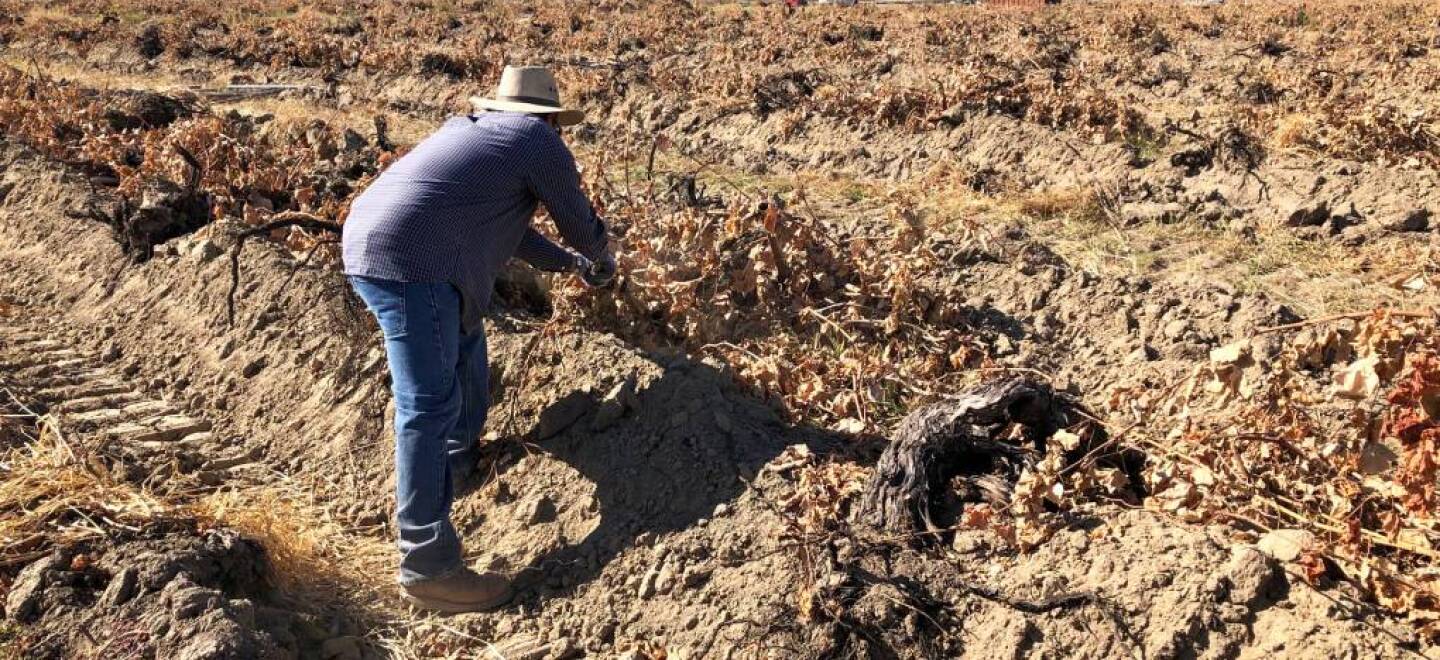President Joe Biden’s pick to lead the nation’s worker health and safety efforts largely failed in his previous job to enforce protections for California outdoor workers exposed to toxic wildfire smoke. That’s according to an investigation by KQED and The California Newsroom.
As the state faced its largest wildfire seasons on record, employers were required to take steps to prevent millions of outdoor workers from breathing harmful levels of smoke — such as by providing N95 masks or moving them indoors on days with unhealthy air.
But under the leadership of Douglas Parker, who joined the Biden administration last month, the California agency tasked with enforcing the smoke regulations rarely penalized employers for breaking the rules.
Nearly 4 million Californians labor in agriculture, construction, utilities and other industries with outdoor jobs, an analysis of state employment figures shows. Parker led the California Division of Occupational Health and Safety, known as Cal/OSHA, as it cited employers just 11 times in the more than two years between July 2019, when the smoke protections went into effect, and October 5, 2021, according to data provided by the agency.
Last month Parker joined the Biden administration to lead OSHA at the federal level, as assistant secretary for the U.S. Department of Labor.
In interviews and advocate surveys, vulnerable workers in the state’s $60 billion agricultural industry reported they labored in heavy smoke without any of the required safeguards, pointing to a potentially widespread problem of employers not following the first-in-the-nation requirements.
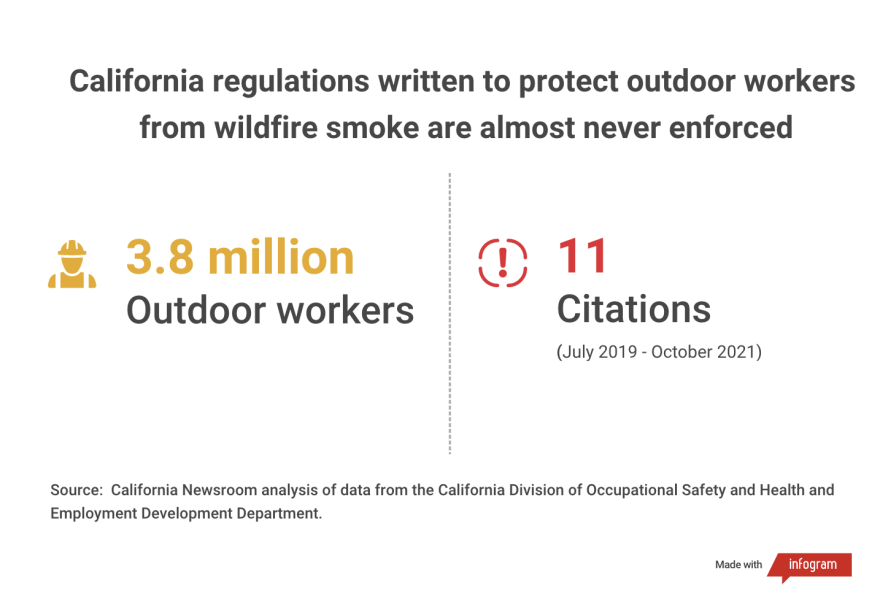
The smoke “affects me on my chest, and I get a very hoarse voice and a lot of cough,” said Alejandra Beltran, 44, who harvested raisins in Fresno County during this year’s wildfire season.
As she browsed boxes of groceries at a food bank in the small town of Biola, Beltran said she had never heard of the regulations that are meant to protect her, despite a provision mandating that employers educate workers about the health risks of breathing wildfire smoke “in a language and manner readily understandable by employees.” Beltran said she also was never offered an N95 mask, or other protections required by the smoke regulations.
'We have to do a better job'
In an interview, state Assemblymember Robert Rivas (D-Salinas), chair of the Assembly Agriculture Committee, called the state’s enforcement to date “disappointing.”
“Eleven violations is obviously a very low number, but it's certainly, in my opinion, not a true reflection of potential issues that are out there,” he said. “We have to do a better job.”
Rivas proposed a bill that would have stepped up enforcement by establishing dedicated Cal/OSHA “strike teams” of inspectors that would be deployed to agricultural worksites on days with unhealthy air. It was gutted in August after generating opposition from Gov. Gavin Newsom’s administration, according to documents viewed by The California Newsroom and people close to the negotiations.
The documents show the California Labor and Workforce Development Agency, which oversees Cal/OSHA, requesting amendments to the bill, including deleting the “strike teams” provision. Rivas ultimately agreed to take it out.
“Having a mechanism of enforcement is incredibly important,” said Rivas, who grew up in a farmworker family. “My effort here was not trying to penalize growers in any way or the agricultural industry, but it was to achieve a level of accountability.”

Spokespeople for the Labor and Workforce Development Agency and Newsom’s press office did not respond to multiple inquiries. In an email, Parker alluded to his new position in the Biden administration and declined to comment, saying he wanted “the chance to study more about what has been happening outside of California.” He referred our inquiry back to Cal/OSHA.
The agency’s acting chief, Danielle 'Dan' Lucido, defended Cal/OSHA’s record.
“We are a leader in providing worker protection, including against smoke,” she said. “We care very much about enforcement of this regulation.”
It was Parker himself who petitioned Cal/OSHA to create the protections. In December 2018, prior to his tenure at the agency, Parker joined with labor advocates, writing that “an emergency standard needs to be put in place as soon as possible, since wildfires are now occurring during many months of the year.”
Little outreach, few complaints, fewer inspections
Breathing dangerous particulate matter in wildfire smoke can cause eye and throat irritation, persistent coughing, wheezing or difficulty breathing. Exposure to so-called PM 2.5 also can lead to more serious health problems, such as reduced lung function, heart failure and early death.
A September investigation by The California Newsroom linked the rise of wildfire smoke to sharp increases in hospitalizations for heart and lung conditions in the state. It also found a dramatic rise in prescriptions for the asthma medication albuterol as the number of “smoke days” increased.
RELATED: Dangerous Air: As California Burns, America Breathes Toxic Smoke
Beltran and other farmworkers in Fresno County told KQED and The California Newsroom their employers never mentioned the required protections against smoke.
“Some things they just like to keep to themselves,” said Beltran, the mother of six children. “And obviously we are the ones put at risk.”
The experience of Beltran and other farmworkers who labor outside expose a Catch-22 scenario on the enforcement of the wildfire smoke regulations.
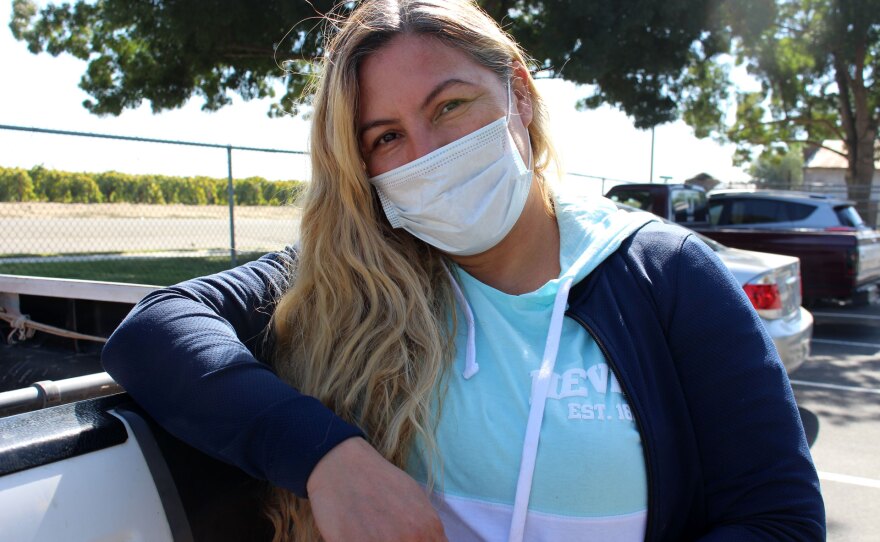
Without strike teams of inspectors in the field, Cal/OSHA typically only shows up to worksites following a complaint. But the lack of awareness about required protections and workers opting to not report problems because they fear retaliation means Cal/OSHA has carried out very few inspections.
The agency received only 221 complaints related to wildfire smoke and visited worksites for just 26 employers between July 2019 and October 5, 2021, the data shows.
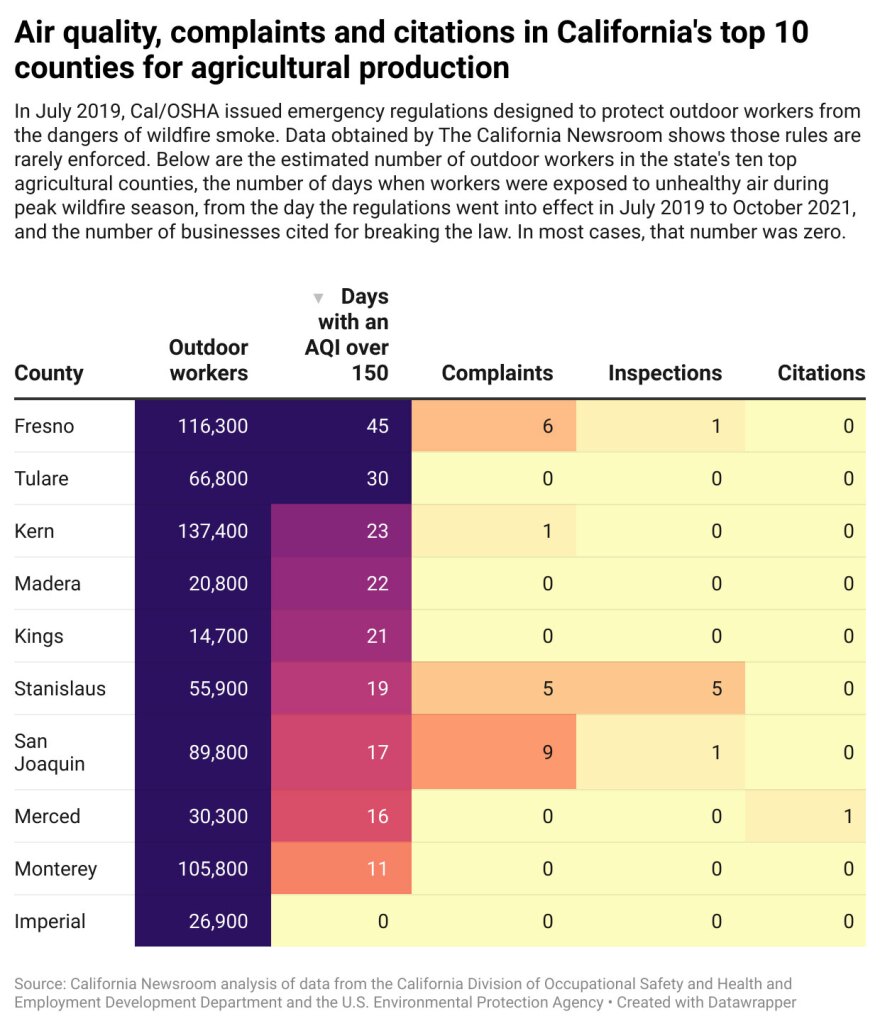
Lucido said the small number of inspections did not indicate a problem. “Whenever we are put on notice through a complaint, we do what we're supposed to do and roll out to investigate, if there’s a serious complaint,” she said.
The agency responded to most of the rest of those complaints by sending a letter to employers, asking them to respond to concerns in writing. Observers say that rarely leads to fines.
I always find it very ironic when the agencies brag, 'Oh, we have more stringent rules [than] the entire nation.' Well, those rules are out there. But if you don't enforce them, then there's nothing good out of them.
The California Farm Bureau Federation, the state’s largest agricultural trade group, has been working tirelessly to ensure agricultural employers know about the rules and to help them comply, a representative said.
“Having workers who are not healthy is not a very good way to get the work done,” said Bryan Little, who directs human resources policy for the federation. He has led many trainings on wildfire smoke regulations for the organization’s 33,000 members, he said.
“The people that I've talked to certainly leave me with the impression that they're trying very hard to make sure that they get their compliance issues right,” said Little.
But workers’ statements to KQED and The California Newsroom coincide with the findings of a recent survey of more than 300 agricultural workers in the San Joaquin Valley conducted by the nonprofit Central California Environmental Justice Network.
“The rule is not working,” said Nayamin Martinez, the network’s executive director. “I always find it very ironic when the agencies brag, ‘Oh, we have more stringent rules [than] the entire nation.’ Well, those rules are out there. But if you don’t enforce them, then there's nothing good out of them.”
Nearly 60% of farmworkers surveyed in Fresno, Kern, Kings, Madera and Tulare counties said that their employers did not provide N95 masks or that they did not know what N95s were. About 45% reported they were not aware of California’s wildfire smoke protections, said Martinez, whose small nonprofit developed wallet cards in Spanish to educate workers about the rules.
Speaker 1: (00:01)
And now for part two of an investigation, the California report brought us yesterday. [inaudible] Romero has been investigating the state's failure to enforce regulations, meant to protect farm workers and others exposed to wildfire smoke. She found that earlier this year, lawmakers tried to boost enforcement, but governor Gavin Newsome's administration stepped in and blocked their efforts
Speaker 2: (00:29)
At a food bank in the town of Viola and Fresno county volunteers help [inaudible] load groceries into cardboard boxes and carry them to her pickup truck. What a vineyard Beltron is a farm worker. This fall. She worked in the fields, harvesting grapes for raisins. She says, including shifts and thick wildfire smoke.
Speaker 3: (00:49)
Personally me, it affects me on my, you know, my chest and I get very like a horse he voice, and then produces a lot of
Speaker 2: (01:00)
Tiny particles and wildfire smoke can trigger asthma attacks, strokes, and other serious health problems. Since 2019, California employers have been required to protect workers when smoke levels become unhealthy by offering them N 95 masks, for example, or moving them indoors. But farmworkers like Beltran told us they never heard about those regulations. He says she never got an N 95 nor the training employers are supposed to give workers about the health hazards of smoke. As far as
Speaker 3: (01:32)
My knowledge, you weren't told anything,
Speaker 2: (01:35)
An estimated 4 million Californians work outdoors, but data obtained by KQBD and the California newsroom show that over the more than two years, the smoke regulations have been in place. The state dispatched inspectors to only 26 employers that led to just 11 citations for violations of the wildfire smoke standard
Speaker 4: (01:58)
11 violations, you know, obviously is a very low number,
Speaker 2: (02:01)
California assemblyman, Robert Rivas chairs, the assemblies agriculture committee. He introduced a bill that would have required the government to send strike teams of inspectors to the fields. Whenever smoke levels become dangerous.
Speaker 4: (02:15)
Having a mechanism of enforcement is incredibly,
Speaker 2: (02:19)
But the provision was deleted last summer after opposition from governor Gavin Newsome's administration, that's according to internal documents, we viewed and interviews with people close to the negotiations.
Speaker 4: (02:32)
I effort here was not trying to penalize growers in any way and you know, uh, or the agricultural industry, but it was to, you know, achieve a level of accountability.
Speaker 2: (02:43)
Governor Newsome press office did not respond to multiple requests for comment. And neither that has labor and workforce development agency, which documents show wanted the strike teams removed. Dan Lucido did talk to us as acting of CalOSHA she's in charge of enforcing the smoke rules. She also didn't want to comment on the changes to the bill, to the extent that
Speaker 5: (03:07)
Any amendments were made, it would have been the author's decision to amend the bill. Not ours.
Speaker 2: (03:14)
Lucido says her agency is a leader in providing worker protections, including against wildfire smoke. She says, Callow shop is not opposed to sending strike teams out on smoky days. She acknowledged they've been short on outreach and blame the pandemic, but now she says the agency is trying to get the word out about the smoke regulations like through this video and English and Spanish posted on their website and California.
Speaker 6: (03:40)
Yeah. [inaudible]
Speaker 2: (03:43)
I'm guessing when farm workers say they still don't know about the protections. So the rules not working says Niamey Martinez. She directs the central California environmental justice network.
Speaker 7: (03:56)
I always find it very ironic when the is brag about, oh, we have the most stringent rules in the entire nation. Well, you can have rules, but if you don't enforce them, then there's nothing good out of them.
Speaker 2: (04:10)
Athena says, organization surveyed more than 300 farm workers in San Joaquin valley. Earlier this year, nearly 60% reported that their employers did not provide a 95 masks or that they did not know what N 90 fives were.
Speaker 1: (04:26)
That was for Rita Jubala Romero with the latest and the ongoing series, dangerous air.
Industries where workers labor outdoors — such as agriculture, construction and landscaping — depend on a significant proportion of undocumented workers who are especially fearful of retaliation if they report problems. These workers may also face language and other barriers that make it more difficult to alert Cal/OSHA about conditions at their worksites, said Anne Katten, who directs the California Rural Legal Assistance Foundation’s pesticide and work safety project.
“There needs to be much more outreach and it needs to be linguistically and culturally appropriate for workers,” said Katten, who joined Parker in petitioning Cal/OSHA for the protections. “It needs to be more high-profile. There needs to be a real, proactive program of having public service announcements and information.”
Martinez suspects many small employers, especially Spanish-speaking farm labor contractors, also are unaware of the regulations. Others have difficulty monitoring the air quality index, or AQI, as prominent air quality websites are in English only, she said.
Only two agricultural employers were issued fines by Cal/OSHA inspectors for failing to provide enough respirators or effective training to employees exposed to wildfire smoke, agency data shows.
Cal/OSHA's troubled history
The paltry enforcement of the state smoke standard is just the latest example of the agency being slow to act on regulations that respond to crises made worse by climate change.
In 2015, Cal/OSHA settled a lawsuit brought by five farmworkers and the United Farm Workers union that accused the agency of neglecting its duty to enforce a 2005 law that protects outdoor workers from excessive heat. Farmworkers had died from heat-related illnesses while on the job.
The agency agreed to increase its scrutiny of workplaces during high-heat months, and also waged a massive education campaign about the protections, which require employers to provide basics like access to fresh water and shade, said Kevin Riley, who directs UCLA’s Labor Occupational Safety and Health Program.
The result said, Martinez, are radio announcements about the heat standard broadcast in multiple languages. “You can see billboards everywhere,” she said. “Compared to that, I didn’t see as much education, public education about the wildfire rule.”
Meanwhile, Cal/OSHA also struggled with staffing shortages that worsened during the pandemic. The vacancy rate for inspectors statewide reached 26% in February, according to Cal/OSHA, but the agency was able to hire dozens of safety engineers and industrial hygienists. Its vacancy rate for those positions is now just 16%. Still, the agency has been overwhelmed by COVID-19 related complaints, say labor advocates, and cut down on in-person visits to worksites for months.
Lucido, the current head of Cal/OSHA, acknowledged that the pandemic undercut the agency’s ability to increase awareness about the rule, but pushed back against the notion that enforcing the wildfire smoke protections is not a priority for the agency.
“We are determined to enforce this regulation and educate workers about their rights,” she said. “Having the pandemic in play for a year and a half of this new regulation impacted our ability to create materials and do other things that we would have wanted to do to engage in outreach.”
In the last six months, the agency has posted videos and other training materials on its website about the regulations in Spanish and English and met with community-based organizations that can help workers file complaints, she added. But there has been no massive public outreach campaign.
One worker's story
California’s wildfire smoke requirements for employers are activated only when outdoor workers may be exposed to wildfire smoke and the air quality index for PM 2.5 reaches 151 or above, which the federal Environmental Protection Agency deems “unhealthy.” At that level, employers must offer workers N95 masks or make changes to reduce workers’ exposure to the smoke. Wearing N95 masks is compulsory when the AQI hits 500 or more, a level rarely reached during even the worst wildfires and 200 points higher than the standard for “hazardous” set by the federal government.
Out of the top 10 agricultural counties in the state, most of which lie in the San Joaquin Valley, Fresno has experienced the most wildfire season days with an AQI greater than 150, according to an analysis by KQED and The California Newsroom of EPA historical air quality data. Since the smoke rule went into effect, Fresno has seen a total of 45 “unhealthy” air days during peak wildfire season.
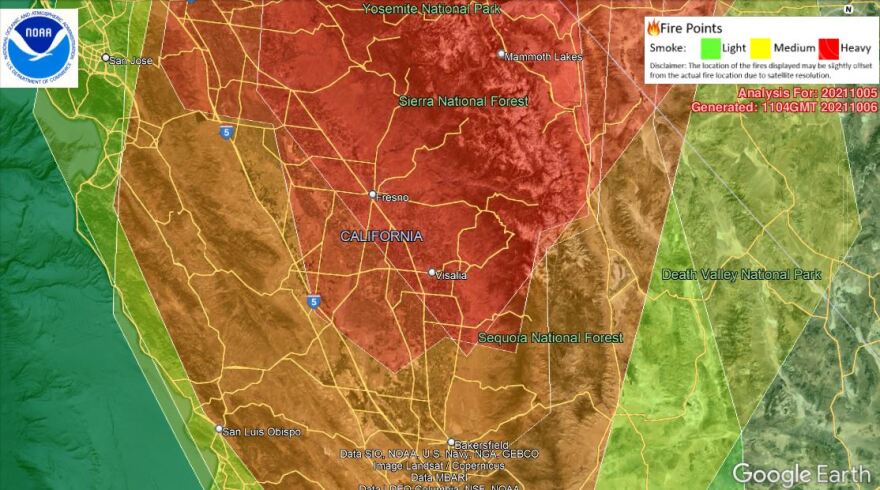
On one of those days, Oct. 5, 2021, a 33-year-old immigrant from Mexico said he worked a regular shift pulling dry grapevines from the soil by a Fresno highway. The AQI hovered around 160 in the county, according to the EPA, while federal satellite images showed intense smoke blanketing the field where he worked.
“The smoke was really thick, you could really feel it,” said the worker, who has labored in the U.S. for 15 years, in Spanish. “My throat hurt that day.”
But his employer, a farm labor contractor that he identified as Can II Ag Mgt. Inc., has never offered training or N95 masks on smoky days, he said. A large banner for the company was tied to a portable toilet in the field where he toiled.
“At work they haven’t given us masks at all,” said the worker, who was surprised to learn about the safeguards. “They’ve never given us classes on what to do when there’s a lot of pollution because of the smoke.”
KQED is withholding the man’s name because he fears retaliation from his employer and, like more than 40% of agricultural workers in the state, is undocumented. A second farmworker who said he also was employed by Can II Ag Mgt., which is based in Kerman, provided similar testimony.
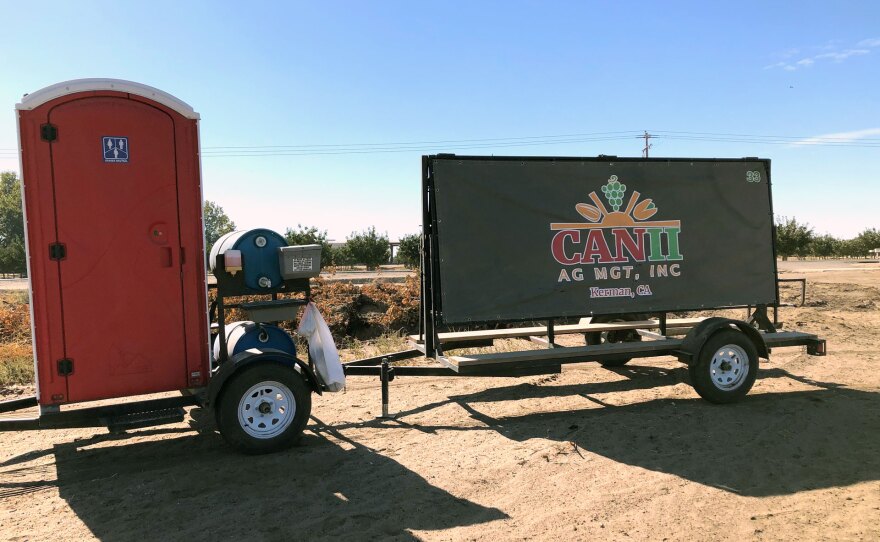
Several attempts to reach Guillermo Cantu, Can II Ag Mgt.’s chief executive officer according to California corporate filings, were unsuccessful. But his wife and co-worker, Angie Garcia, said they were aware of the wildfire smoke rule and referred questions to their attorney.
“We provide everything necessary to use while they are working,” she said.
The company’s attorney, Anthony Raimondo, denied the allegations made by farmworkers, but declined to provide evidence that Can II Ag Mgt. had taken any steps to reduce workers’ exposure to wildfire smoke.
“The company is in compliance with all the rules of the state of California. We deny the allegations 100%,” said Raimondo, president of Raimondo & Associates in the city of Fresno. “These are uncorroborated, unsubstantiated statements. And there’ll be no further comment.”
The data provided by Cal/OSHA show no workers filed a complaint against this company.
Farida Jhabvala Romero is a reporter for KQED in San Francisco. She produced this investigation for The California Newsroom. Aaron Glantz, senior investigations editor for the newsroom, edited this story with managing editor Adriene Hill. It was edited by David Marks and copy edited by Jenny Pritchett of KQED.
The California Newsroom is a collaboration of NPR, 17 public radio stations across the state, from San Diego to the Oregon border, and CalMatters.

